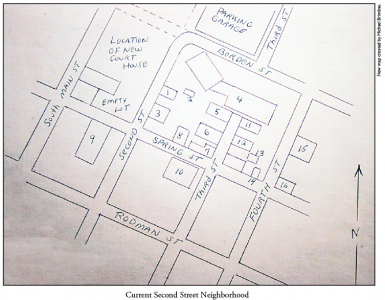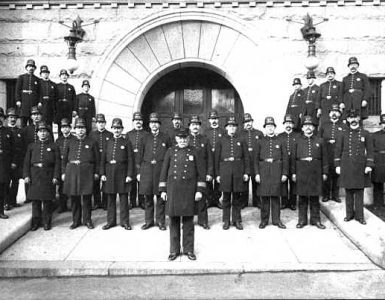by Harry Widdows
First published in August/September, 2005, Volume 2, Issue 4, The Hatchet: Journal of Lizzie Borden Studies.
From his early columns on the case to his tragic death in December 1892, without a doubt one of the more controversial figures in the Borden saga is Henry G. Trickey, a reporter for the Boston Globe at the time of the murders. It was under his authorship that the notorious and completely false story, known as the Trickey-McHenry article, was published in the Boston newspaper in October 1892.
Without going into the details concerning that article, let’s take a closer look at Mr. Trickey.
We know that Henry G. Trickey was born in Dover, New Hampshire, in 1868, making him 24 years old at the time of the tragedy. Apparently a very bright young man, upon graduating from high school with honors he went to work for a law firm in Boston. Deciding against a career in that profession, at the age of 17 he secured a position as a reporter for a Cambridge, Massachusetts, newspaper. He soon left that paper and in 1885 began working for the Boston Globe.
He quickly established himself as a prominent reporter for the Globe, traveling to Mississippi in 1886 to interview the ex-president of the Confederacy, Jefferson Davis.
In 1890, he married Miss Gertrude Melzar of Wakefield, Massachusetts. They made their home in the Dorchester section of Boston. One of the guests at the wedding, a private affair, was none other than Orinton M. Hanscom, the Pinkerton detective hired by the Borden sisters after the murders. Hanscom’s wedding gift to the young couple was described as a “banquet lamp” [1].
Trickey covered some major stories of the time, one being the Graves/Barnaby murder trial in Denver, Colorado in 1891. Dr. Graves had ingratiated himself with an aged wealthy woman, a patient, Mrs. Barnaby, to the extent of his being included in her will. When she balked at his increasing influence in her affairs he decided upon murder. He sent her a bottle of arsenic and described it as a “fine old whiskey.” Dr. Graves was arrested, tried, and convicted. Although later obtaining a reversal of the conviction and a new trial, Dr. Graves committed suicide in 1893 before that could be held.
At a web-site, “Clews, the Historic True Crime Blog” written by Ms. Laura James in May 2005, the following paragraph appears:
There’s a fascinating footnote to the Graves trial for the well read true-crime aficionado. Anyone familiar with the Lizzie Borden case will recognize the names Henry G. Trickey and Edwin McHenry. Both worked up the case against Dr. Graves and testified against him on minor points at the trial. Trickey also told the jury about the disparaging remarks Dr. Graves made about his dead patient. Those who know the names will have an opinion on the credibility of their testimony [2].
In early December 1892, the same grand jury that indicted Lizzie Borden heard charges against Trickey. It was rumored that the charge consisted mainly of attempting to interfere with a government witness, Bridget Sullivan, by inducing her to flee with Mrs. McHenry out of the jurisdiction of the court. His sudden death terminated that process.
However, Attorney General Pillsbury, who apparently had some knowledge of Trickey, was not so sure of Trickey’s reported death and sent an agent to verify that it indeed was he who died [3].
Trickey had left Boston after the publication of the false material, first going to his brother-in-law’s home in Evanston, Illinois, and from there to Hamilton, Ontario, Canada.
While in Hamilton, Trickey registered at the hotel as “Henry Melzar, New York,” assuming his wife’s maiden name [4]. On the morning of December 3, 1892, after arising late, he hurried to the train depot to catch a train bound for Guelph, Canada. In an attempt to board the moving train he slipped and fell beneath the cars, the train wheels passing over his body. He died a few minutes later, unable to speak. His brother-in-law, Mr. E. P. Melzar of Evanston, Illinois, secured the body and took it home to Boston for interment at Forest Hills cemetery in Boston [5].
The funeral was private and well attended by the Boston Globe staff and friends. Again the name Orinton M. Hanscom, the Pinkerton detective, surfaces as one attending the funeral [6]. This, along with his presence at Trickey’s wedding, would seem to indicate a level of personal friendship between the two.
It was Melvin O. Adams, one of Lizzie’s counsels, who defended Hanscom in his dismissal by the Boston Police in 1888 [7]. And it was Adams’ name that was allegedly given to McHenry by Trickey as the one wanting to know the evidence in the government’s case against Lizzie Borden.
The connection of Adams and Hanscom with Trickey is open to speculation as it applies to the Borden tragedy.
Also inviting speculation is just what was Trickey’s motive in the writing of the false article. He had already achieved in a short career above normal recognition as an accomplished reporter and there was no immediate financial gain to him.
Trickey covered the Borden preliminary hearing and any reading of his columns shows no serious indication of a belief in Lizzie’s guilt or innocence. At the end of the preliminary he was one of those interviewed for comments regarding Judge Blaisdell’s decision to hold Lizzie for the grand jury. He said, as printed in the Boston Globe of September 3, 1892, and a month before the printing of the bogus article:
On the evidence presented by the Commonwealth in the preliminary examination of Lizzie A. Borden, no jury would be justified in rendering a verdict against her. On the evidence submitted, I doubt if the grand jury, unless especially advised by the district attorney, would even return a true bill. I fully believe, however, that Judge Blaisdell was justified in committing the defendant. His judgment in any event would not be final. If he discharged her, she could be immediately rearrested on a bench warrant, and would have been, without a shadow of doubt [8].
Trickey’s tragic death before he could be questioned, not only ended a young life but created yet more clouds of mystery that still linger over the Borden murder case.
Notes:
[1] “Trickey-Melzar,” The Boston Globe, 4 January 1890: 2
[2] http://laurajames.typepad.com/clews/2005/05/the_infamous_dr.html
[3] Martins, Michael and Dennis Binette, eds., The Commonwealth of Massachusetts vs. Lizzie A. Borden, the Knowlton Papers, 1892-1893, HK116 and HK120.
[4] “Henry G. Trickey Dead,” The Boston Globe, 5 December 1892: 1, 5.
[5] “Funeral of Henry G. Trickey,” The Boston Globe, 6 December 1892: 8.
[6] “Buried in Flowers,” The Boston Globe, 7 December 1892: 8.
[7[ “Small against Hanscom,” The Boston Globe, 1 June 1888: 2.
[8] “No Trial,” The Boston Globe, 3 September 1892: 1, 4.






